|
|
|
Sort Order |
|
|
|
Items / Page
|
|
|
|
|
|
|
| Srl | Item |
| 1 |
ID:
089983
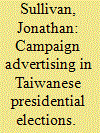

|
|
|
|
|
| Publication |
2009.
|
| Summary/Abstract |
Campaign advertising in Taiwan, particularly at the presidential level, has increased in importance as the political and media contexts in which campaigns are fought has evolved. To further our understanding of this increasingly prevalent campaign tool, the article analyses a large number of television and newspaper advertisements for six presidential candidates across three campaigns. Extending prior research on Taiwan the analysis incorporates three dimensions of campaign advertising: the distribution, composition and tone of appeals. The findings suggest that, for better or worse, many elements of broader political competition in Taiwan are equally present in candidates' campaign advertising.
|
|
|
|
|
|
|
|
|
|
|
|
|
|
|
|
| 2 |
ID:
187665
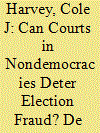

|
|
|
|
|
| Summary/Abstract |
Many nondemocracies hold multiparty elections while also adopting institutions of de jure judicial independence; yet there is debate over how nondemocratic courts can affect election integrity. This paper argues that increased de jure independence creates incentives for opposition recourse to the courts, which reduces election fraud due to greater legal exposure for election-manipulating agents and the ruling party. However, this effect occurs only when competition is low and the ruling party has limited incentive to intervene. These predictions are distinct from those of prior work, and they are supported by an analysis of cross-national election-year data from 1945 to 2014. Preprocessing techniques are used to reduce concerns about endogeneity and confounding. The results show that principal-agent dynamics can occur in manipulated elections even when incumbents remain in office, challenge the centrality of protest risk as a deterrent to manipulation, and offer a framework for predicting when de jure reforms translate to behavioral independence.
|
|
|
|
|
|
|
|
|
|
|
|
|
|
|
|
| 3 |
ID:
141646
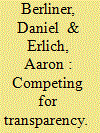

|
|
|
|
|
| Summary/Abstract |
Why do political actors undertake reforms that constrain their own discretion? We argue that uncertainty generated by political competition is a major driver of such reforms, and test this argument using subnational data on Mexican states’ adoption of state-level access to information (ATI) laws. Examining data from 31 Mexican states plus the Federal District, we find that more politically competitive states passed ATI laws more rapidly, even taking into account the party in power, levels of corruption, civil society, and other factors. The fine-grained nature of our data, reflecting the staggered timing of elections, inauguration dates, and dates of passage, allows us to distinguish between different theoretical mechanisms. We find the greatest evidence in favor of an insurance mechanism, by which incumbent parties who face uncertainty over future political control seek to ensure access to government information, and means of monitoring incumbents, in the future in case they lose power.
|
|
|
|
|
|
|
|
|
|
|
|
|
|
|
|
| 4 |
ID:
165403
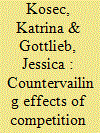

|
|
|
|
|
| Summary/Abstract |
Political competition is widely recognized as a mediator of public goods provision through its salutary effect on incumbents’ electoral incentives. We argue that political competition additionally mediates public goods provision by reducing the efficiency of legislative bargaining. These countervailing forces may produce a net negative effect in places with weak parties and low transparency—typical of many young democracies. We provide evidence of a robust negative relationship between political competition and local public goods using panel data from Mali. Tests of mechanisms corroborate our interpretation of this relationship as evidence of legislative bargaining inefficiencies. To explore the generalizability of these findings, we analyze cross-country panel data and show that political competition leads to better (worse) public goods provision under high (low) levels of party system institutionalization. The paper sheds light on why political competition is only selectively beneficial, and underscores the importance of considering both the electoral and legislative arenas.
|
|
|
|
|
|
|
|
|
|
|
|
|
|
|
|
| 5 |
ID:
130962
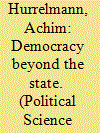

|
|
|
|
|
| Publication |
2014.
|
| Summary/Abstract |
MODERN DEMOCRACY IS, ABOVE ALL ELSE, a procedural ideal. To be sure, high substantive hopes are often placed in democracy. Yet the essence of democracy lies not in the specific outcomes that it may (or may not) help reach, but in a set of procedures that ensure, in the words of Philippe Schmitter and Terry Karl, that "rulers are held accountable for their actions in the public realm by citizens," who act primarily "through the competition and cooperation of their elected representatives."1 Historically, the main political arena in which democratic procedures have been implemented, and the main reference point for democratic theory, has been the state. According to a well-established argument, the democratization of non-state entities-such as international and supranational organizations or transnational networks with various degrees of institutionalization-is therefore faced with significant conceptual and practical challenges.2 This article seeks to assess the severity of these challenges: Can democratic procedures be transferred to political entities "beyond the state," or is democracy doomed to failure in non-state contexts?
|
|
|
|
|
|
|
|
|
|
|
|
|
|
|
|
| 6 |
ID:
141642
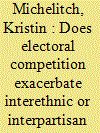

|
|
|
|
|
| Summary/Abstract |
Does political competition exacerbate economic discrimination between citizens on ethnic or partisan cleavages? Individuals often discriminate on group lines in ordinary economic activities, especially in low-income settings. Political competition, and thus mobilization of partisan and ethnic groups, waxes and wanes over the electoral cycle. This study therefore investigates discrimination over the electoral cycle in a commonplace yet consequential economic activity: market price bargaining. By conducting field experiments on taxi fare bargaining at three points in time around Ghana’s 2008 election, the research reveals that drivers accept lower prices from coethnics regardless of temporal proximity to the election. However, only at election time, drivers accept lower prices from copartisans and demand higher prices from noncopartisans. In sum, political competition affects commonplace economic transactions between citizens on the partisan cleavage. This study is the first to show evidence of interpartisan discrimination in everyday behavior and expands our knowledge of electoral cycle effects.
|
|
|
|
|
|
|
|
|
|
|
|
|
|
|
|
| 7 |
ID:
072145
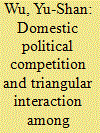

|
|
|
| 8 |
ID:
131387
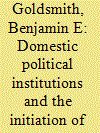

|
|
|
|
|
| Publication |
2014.
|
| Summary/Abstract |
There is doubt about whether the 'democratic peace' proposition applies in Asia. I theoretically deconstruct regime type into institutional components including political competition, constraint on the executive, and mass participation, and ask whether taking these as distinct causal factors gives more empirical purchase on the relationship of domestic political institutions to states' external conflict behavior. I find that higher levels of political competition are associated with a lower likelihood of conflict initiation, but only when the potential target is relatively democratic. Thus, my directed-dyad analysis is consistent with a democratic peace effect in East Asia. It is also suggestive regarding the observed 'East Asian peace' that has existed since 1979, because levels of political competition have risen considerably in the region, beginning in the late 1970s.
|
|
|
|
|
|
|
|
|
|
|
|
|
|
|
|
| 9 |
ID:
069796
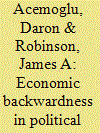

|
|
|
| 10 |
ID:
120510
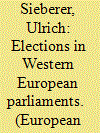

|
|
|
|
|
| Publication |
2013.
|
| Summary/Abstract |
Parliaments often elect holders of important extra-parliamentary offices such as heads of state, constitutional judges, heads of audit institutions and ombudsmen. What drives the behaviour of parliamentary actors and the outcome of such elections? This article explains actor behaviour theoretically, drawing on spatial factors, principal-agent arguments about the importance of nonspatial candidate characteristics and signaling arguments about competitive considerations beyond the specific election. Empirically, it provides the first comparative analysis of such elections outside the United States Senate using original data on 100 elections for four external offices in 14 Western European parliaments. The findings show that spatial variables, nonspatial candidate characteristics and features of the competitive context systematically affect the election outcome. The article contributes to comparative parliamentary research in general by demonstrating how parliamentary activities, other than lawmaking, can be analysed using established theories and by showing that consensual aggregate outcomes can be explained within a competition-based rational choice model.
|
|
|
|
|
|
|
|
|
|
|
|
|
|
|
|
| 11 |
ID:
142276
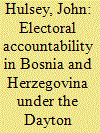

|
|
|
|
|
| Summary/Abstract |
This article examines the ways in which Bosnia's continuing governance problems are rooted in the relationship between voters and parties implied in the Dayton Accords. Political competition and the party system in Bosnia are influenced by the structure of government and electoral system in the Dayton Accords and subsequent regulations, which gives preference to a model of representation based on ethnic parties. This article examines the party system and nature of competition in order to show the weaknesses in this ethnic model of representation as well as the ongoing inability to establish alternative models such as broad multi-ethnic parties.
|
|
|
|
|
|
|
|
|
|
|
|
|
|
|
|
| 12 |
ID:
160421
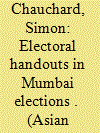

|
|
|
|
|
| Summary/Abstract |
Why do candidates give voters handouts during political campaigns? Drawing on qualitative data from Mumbai, this article argues that competitive elections prompt candidates to distribute handouts for strategic reasons. While they know handouts to be inefficient, candidates face a prisoner’s dilemma. Fearing that their opponents will distribute handouts, they distribute them themselves to counter, or neutralize, their opponents’ strategies.
|
|
|
|
|
|
|
|
|
|
|
|
|
|
|
|
| 13 |
ID:
132522
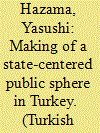

|
|
|
|
|
| Publication |
2014.
|
| Summary/Abstract |
Why has the state-centered recognition of the public sphere prevailed in Turkey over the last decade? A frame analysis of the public sphere discourse for 2002-09 reveals that the contingency of the discourse on the Islamic headscarf issue discouraged an essential understanding of the authentic public sphere. The dominant frame espoused by secularists claimed that the state banned headscarves in the public sphere were to preserve the neutrality of the public sphere. By contrast, pro-Islamists initially adopted an alternative counter-frame based on the Habermasian perspective, portraying the public sphere as tolerant of various ideas. Yet, in the face of stiff opposition from secularists, the pro-Islamists came to use a negative counter-frame with increasing frequency, implying that the state-centered public sphere impinged on the freedom to wear a headscarf. As a result, both the secularists' and pro-Islamists' frames helped entrench the recognition of the state-centered public sphere in Turkish society (Earlier and longer versions of this paper have appeared as IDE Discussion Paper Series No.262 (November 2010) and in Japanese in Ajiakeizai, Vol 52, No. 4 (April 2011)).
|
|
|
|
|
|
|
|
|
|
|
|
|
|
|
|
| 14 |
ID:
131058
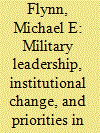

|
|
|
|
|
| Publication |
2014.
|
| Summary/Abstract |
How does political competition among domestic actors influence foreign policy choice? Studies examining these questions often focus on the role of economic or partisan interests, and how they influence the preferences of decision makers who are subject to electoral institutions and pressures of their constituents. Less attention has been paid to how the preferences of other influential but unelected actors influence state behavior. I examine the influence of one such group by looking at how American military leaders shape decisions on military spending and force structure, while also examining how these decisions have been affected by changes to the institutions governing civil-military relations. Results indicate that military leaders occupying key positions can influence defense spending priorities in favor of their respective branches. Results also suggest the influence of military leaders has changed and is conditional upon the institutions governing the relationships between civilian decision makers and military leaders
|
|
|
|
|
|
|
|
|
|
|
|
|
|
|
|
| 15 |
ID:
144677
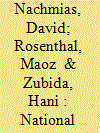

|
|
|
|
|
| Summary/Abstract |
Israeli national parties show a high variance in their tendency to compete in local elections for local authorities’ mayoral position and council seats. Indeed national parties can use local electoral competition to garner support for national elections. However, national parties might be also exposed to local losses and commitments which will hurt their performance in national elections. The results of Israeli ballot-box data from the 2006 national and the 2008 local elections show that Israeli national parties’ decision whether to compete in local elections is affected by the local support patterns in national elections, parties’ valence and the locality’s peripherality.
|
|
|
|
|
|
|
|
|
|
|
|
|
|
|
|
| 16 |
ID:
142109
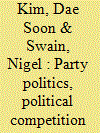

|
|
|
|
|
| Summary/Abstract |
This article considers processes involved in coming to terms with the past in the early years of post-communist Hungary. It addresses the impacts of ‘soft’ late socialism, ‘negotiated’ post-socialist transition, and the intense inter-party and intra-party competition in which Hungary’s first democratically elected government operated. It concludes that claims that Hungary failed to confront the past in the early 1990s miss the mark. The past was confronted openly and aggressively by political actors, but the public will, as reflected in parliamentary legislation, was in favour of measures that resonated with ‘soft’ late socialism and a smooth post-socialist transition rather than political retribution.
|
|
|
|
|
|
|
|
|
|
|
|
|
|
|
|
| 17 |
ID:
068988
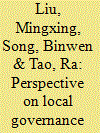

|
|
|
| 18 |
ID:
154392
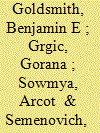

|
|
|
|
|
| Summary/Abstract |
Although some scholars claim that the empirical evidence for the very low instance of interstate war between democracies is well established, others have raised new challenges. But even if democratic peace is observed, its theoretical explanation remains unresolved. Consensus has not emerged among competing approaches, some of which are criticized for offering monadic logic for a dyadic phenomenon. This article synthesizes recent literature to advance a simple, but distinct, explicitly dyadic theory about institutionalized political competition, leading to expectations that it is the most important source of democratic peace. While the authors are far from the first to consider political competition, their approach stands out in according it the central role in a dyadic theory focused on the regime type of initiators and target states. They argue that potential vulnerability to opposition criticism on target-regime-specific normative and costs-of-war bases is more fundamental than mechanisms such as audience costs, informational effects, or public goods logic. Incumbents in high-competition states will be reluctant to initiate conflict with a democracy due to anticipated inability to defend the conflict as right, necessary, and winnable. The authors present new and highly robust evidence that democratic peace is neither spurious nor a methodological artifact, and that it can be attributed to high-competition states’ aversion to initiating fights with democracies.
|
|
|
|
|
|
|
|
|
|
|
|
|
|
|
|
| 19 |
ID:
106149
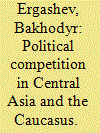

|
|
|
| 20 |
ID:
162211
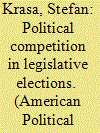

|
|
|
|
|
| Summary/Abstract |
We develop a theory of electoral competition in multidistrict legislative elections when nomination decisions are made by local policy-motivated party members, and voters care about both local and national positions. We show that the asymmetry generated by different national party positions reduces or even entirely removes the competitive pressure to nominate moderate candidates. The model has important implications for our understanding of policy divergence and, in particular, of the effects of gerrymandering.
|
|
|
|
|
|
|
|
|
|
|
|
|
|
|
|
|
|
|
|
|